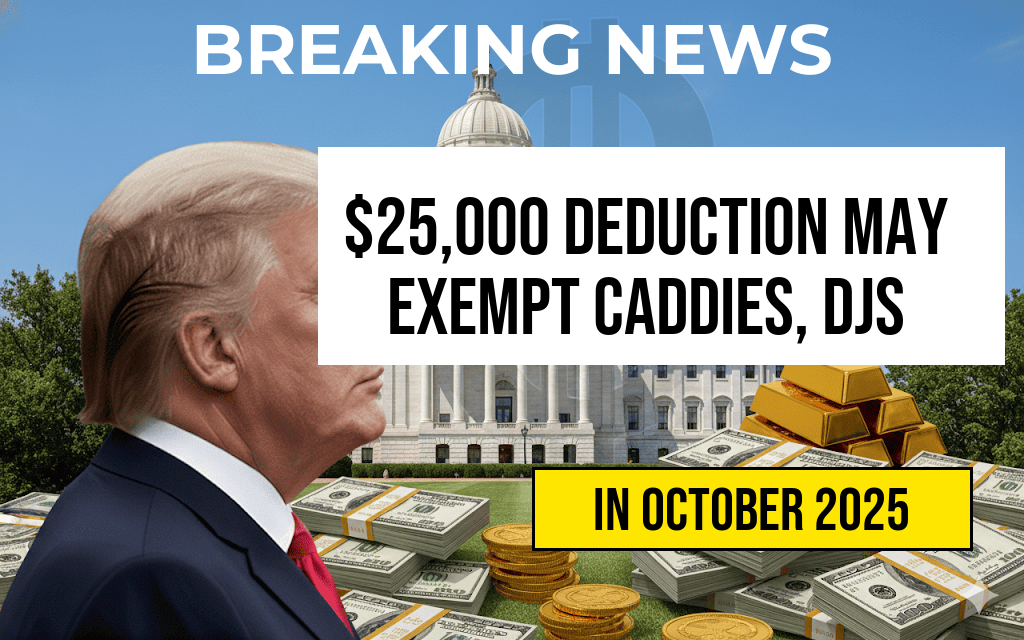A proposed tax deduction list could significantly impact how certain service workers, including golf caddies and DJs, are taxed on tips. Under the new regulations, these professionals may benefit from a $25,000 deduction, potentially exempting them from federal income tax on gratuities received for their services. This change is part of broader tax reforms being discussed in Congress aimed at simplifying the tax code and providing relief to service-oriented occupations, which often rely on tips as a substantial part of their income. As the proposal garners attention, stakeholders in the hospitality and entertainment industries are closely monitoring how these changes could affect earnings and employment practices.
Understanding the Proposed Deduction
The proposed $25,000 deduction is designed to alleviate the financial burden on service workers who frequently receive tips. Currently, many professionals in industries such as golf, hospitality, and entertainment find themselves navigating a complex tax landscape where tips are subject to income tax and payroll tax. The new guidelines aim to simplify this process and provide a clearer framework for taxation.
Who Stands to Benefit?
- Golf Caddies: Often compensated primarily through tips from golfers, caddies could see a substantial reduction in their taxable income.
- DJs: Typically engaged for events and parties, DJs also rely heavily on tips, making them prime candidates for the proposed deduction.
- Other Service Workers: The deduction could extend to a broader range of occupations within the service industry, including waitstaff and bartenders.
What This Means for Service Workers
The implementation of the $25,000 deduction could lead to several significant changes for workers in tip-reliant roles:
- Increased Take-Home Pay: By reducing the taxable income derived from tips, workers could retain more of their earnings.
- Tax Simplification: The proposal aims to streamline tax reporting processes for those who earn tips, potentially reducing the complexity of filing taxes.
- Potential for Job Growth: With increased earnings, there may be a stronger incentive for individuals to enter and remain in service-oriented professions.
Critics and Concerns
While the proposed deduction has received support from many within the service industry, it has also faced criticism. Some tax experts argue that the measure may disproportionately benefit higher earners within these professions, while others worry about the potential for abuse and underreporting of income. Critics highlight the importance of ensuring that all workers are treated equitably under the tax code.
Current Status of the Proposal
The new tax deduction proposal is currently under consideration in Congress and has not yet been finalized. Legislators are engaging in discussions to evaluate its feasibility and potential impact. Various stakeholders, including industry associations and labor unions, are actively lobbying for its approval, emphasizing the importance of supporting service workers during an economic recovery period.
Next Steps for Service Workers
As the proposal moves forward, workers in affected industries should stay informed about its progress. Here are some steps they can take:
- Engage with Professional Organizations: Joining industry groups can provide valuable insights and updates on tax changes.
- Consult Tax Professionals: Understanding how potential changes may affect individual tax situations is crucial.
- Advocate for Fair Policies: Engaging in discussions with lawmakers can help ensure that the voices of service workers are heard in the legislative process.
Conclusion
The proposed $25,000 deduction for golf caddies, DJs, and other service workers presents an opportunity for significant change in how tips are taxed in the U.S. As discussions continue in Congress, the potential benefits and challenges of this proposal will remain a focal point for both lawmakers and those in the affected industries.
For more information on the topic, you can refer to sources such as Forbes and Wikipedia.
Frequently Asked Questions
What is the new $25,000 deduction for golf caddies and DJs?
The new $25,000 deduction allows golf caddies and DJs to potentially be exempt from the tip tax, which can significantly reduce their taxable income.
Who qualifies for the $25,000 deduction?
Golf caddies and DJs who earn tips as part of their income may qualify for this deduction, provided they meet certain criteria set by the IRS.
How does the tip tax affect golf caddies and DJs?
The tip tax imposes additional tax liabilities on earnings from tips, which can be burdensome. The new deduction aims to alleviate this financial pressure for qualifying individuals.
When does this deduction become effective?
The $25,000 deduction is expected to be implemented in the upcoming tax year, allowing eligible golf caddies and DJs to benefit from it when filing their taxes.
How can individuals claim the deduction?
Individuals can claim the $25,000 deduction by accurately reporting their earnings and tips on their tax returns, following the guidelines provided by the IRS.



